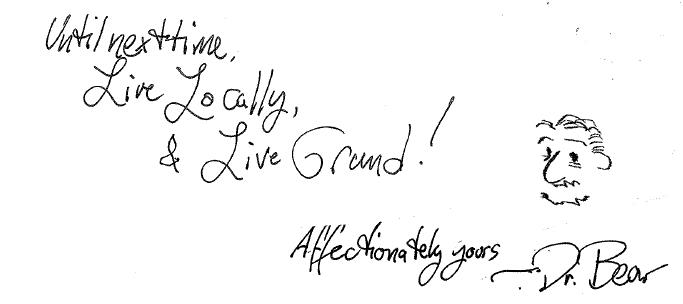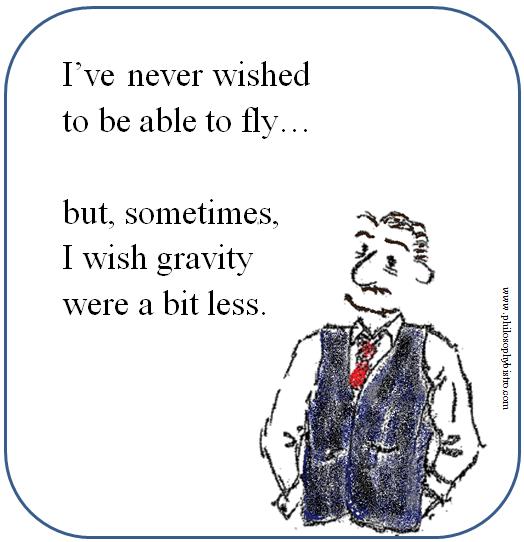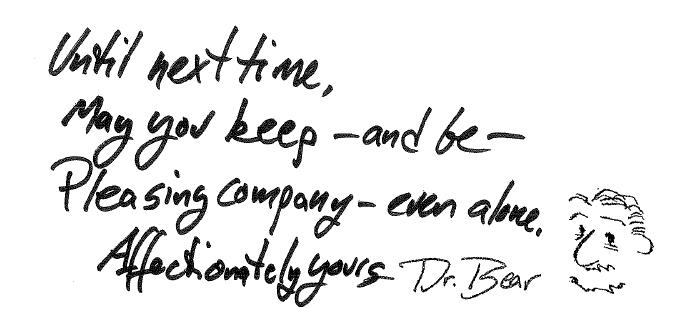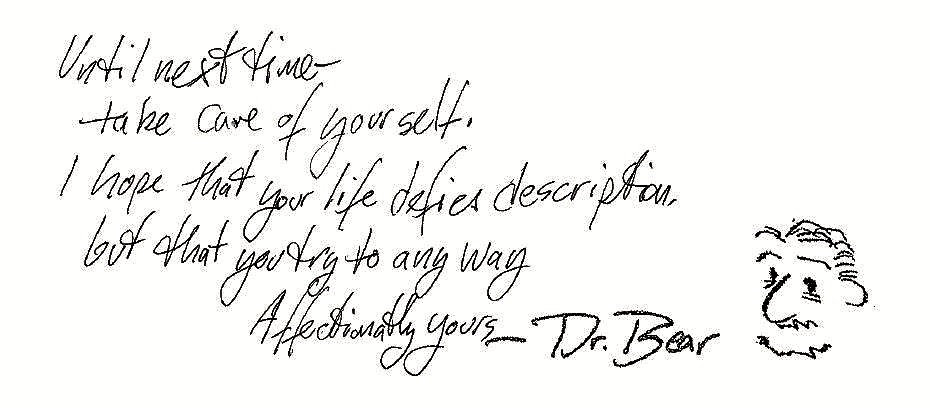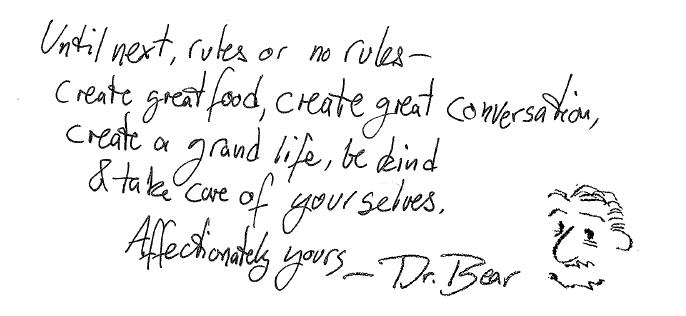Category Archives: Philosophy
Eating like wolves
At a certain point this week, we generated a bit of discussion by posting a 2300 year old quote:
Before looking for something to eat and drink, we should look for someone to eat and drink with, for to dine alone is to lead the life of a lion or wolf.
—Epicurus
Several of you neither mind eating alone, nor mind the comparison to the lion or the wolf. Woad Toad—who prefers misanthropic to antisocial—points
out that both lions and wolves are pack animals—social, that is; toads and polar bears eat alone (and are majestic creatures).
This was an interesting point. I live with a misanthropic (and rather smelly) Cairn terrier who refuses to eat alone. Although his food bowl is there all day, he refuses to eat without somebody nearby. I often end my days standing in the kitchen keeping him company, just so he will finish his meal.
I don’t mind; it’s a small price to pay for another creature’s well-being and happiness, isn’t it?
In case you were wondering, Epicurus was a Greek Philosopher who lived from 341 BC to 271 BC, give or take. He was a thoroughgoing materialist—an atomist, really. He taught that the key to happiness was pleasure, but that we must learn to distinguish between healthy pleasures and destructive cravings. He taught that the most gratifying pleasures were simple, constructive ones—simple but good food, maybe a little cheese, conversation with friends, quiet time in one’s library, time to enjoy nature, etc.
who lived from 341 BC to 271 BC, give or take. He was a thoroughgoing materialist—an atomist, really. He taught that the key to happiness was pleasure, but that we must learn to distinguish between healthy pleasures and destructive cravings. He taught that the most gratifying pleasures were simple, constructive ones—simple but good food, maybe a little cheese, conversation with friends, quiet time in one’s library, time to enjoy nature, etc.
But, yes, he taught that time spent with friends was a necessary to a good life and as nourishing as food and drink.
In fact, he bought a big enough house that he could always have his friends nearby.
Life, in general, is made better by having friends. Of course, we are all aware of how important it is to have friends in a crisis—that lost job, failed marriage, lost child, crappy day at work, diss’ by boyfriend, or even just rain. Yet even good experiences are made better when shared—it seems even more fun when done together. In fact, one of the reasons so many people text or upload pictures is in order to pretend that they have  friends who are there.
friends who are there.
Food is also improved by company—you can talk about how good it is (or bad, if that, and laugh), and the joy of good company adds to the joy of good food, as good food adds to the joy of company. To sit around a table, unhurried, and eat slowly, and talk for hours is a joy like no other. Companionship multiplies itself—you say something funny, one of your companions says something funny, and that prompts you to say something even funnier you would not have thought of alone. All the while, you are enjoying the closeness of each other, the warmth of the place, and the pleasant sensations of good food.
What could be better?
Of course, my lion friends—such as Kirsten and Rachel  (longtime friends of the Bistro, each)—maintain that it is pleasant to eat quietly, by oneself, perhaps in the company of a book. I’ve realized that I do this a lot—in fact, I eat more meals alone than I do with company. When one works with the public, it is often pleasant, and sometimes necessary, to be quiet and alone. Solitude is not the same thing as loneliness—in fact, if you are with a book, it might not even be solitude. By contrast, chatter for its own sake is no better than cold, greasy fast food.
(longtime friends of the Bistro, each)—maintain that it is pleasant to eat quietly, by oneself, perhaps in the company of a book. I’ve realized that I do this a lot—in fact, I eat more meals alone than I do with company. When one works with the public, it is often pleasant, and sometimes necessary, to be quiet and alone. Solitude is not the same thing as loneliness—in fact, if you are with a book, it might not even be solitude. By contrast, chatter for its own sake is no better than cold, greasy fast food.
I guess I’ve given a philosopher’s answer then: both yes and no.
You need time alone, and can enjoy it, but—at least once a week—try to eat with someone else and see what they add to your meal. Some more continental eating places (like Jack of the Woods in Asheville) even have common tables, so that it is unavoidable to eat together.
Food is a necessity, but it can also be a pleasure; why not allow it to be both as much as possible?
Companionship is a necessity, but it can also be a pleasure; why not also allow it to be both as much as possible?
Eating together is a way to combine these necessities and these pleasures in a way that multiplies them; why not?
Our Description Deficit
Tell me something.
That’s really what I want.
Tell me something that shows me what I cannot see, that takes me where I am not, that lets me understand.
Is that too much to ask?
We seem to have lost our ability to use descriptions that actually mean something, and instead, we are mired in the ketchup of bland, meaningless adjectives.
When you say “It was great,” that doesn’t tell me anything about it, just about you—it tells me that you liked it a lot. The same goes for “delicious,” “good,” “pretty,” “crazy,” and a whole host of vague adjectives. You use them out of habit, but they are lukewarm 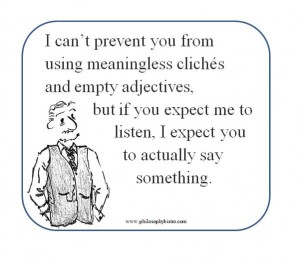 and indefinite, and really don’t say a damned thing. They are clichés that you use as a substitute for thinking about what you are saying—and I suppose you have a right to—but if you expect me to listen, I expect you to actually say something.
and indefinite, and really don’t say a damned thing. They are clichés that you use as a substitute for thinking about what you are saying—and I suppose you have a right to—but if you expect me to listen, I expect you to actually say something.
Don’t even get me started on “awesome” or “nice.” Grrrrr!
When you say you had a good day, that tells me nothing except that your day wasn’t bad; I want to know what made it good. Was it hectic? Was it relaxing? Was it productive? Was it amusing? If amusing (and yes, most of my days are), what made it so?
On the other hand, if you say you had a bad day, that doesn’t tell me much either. Was it boring? Terrifying? Exhausting? Frustrating? Unproductive? Were people cruel? Demanding? Unreliable? Distant?
So it was a good movie. Was it thrilling? Challenging? Surprising? Hilarious? Moving? Did it make you weep or laugh?
When you say the cake was delicious, I want to know what about this specific cake made it so wonderful. Was it rich? Moist? What flavor did it have? Subtle? Dramatic? Sweet? Spicy?
I’ve even heard people say “it was a really nice wedding.” Seriously? For better or for worse, one of the most important days for two people, and a rather momentous one for a lot of people connected to them, and all you can say is “nice?”
Oh. Pardon me. “Really nice”—adding a meaningless adverb to a meaningless adjective just raises the level of insipidness.
(Congratulations and best wishes Rachel and Rebecca, by the way; I’m sure the festivities were so beautiful nobody would dream of describing them as nice.)
An adjective should describe, should tell me something about the thing that it modifies.
An odd thing I’ve noticed about twitter is that very few people even need 140 characters, because we just don’t say very much. For many of us, life events can be reduced to an emoticon. But not for me—for me, life is infinitely rich, and each event is fraught with wonder and complexity. I have never seen a “pretty sunset;” the hard, cold facts of atmospheric conditions produce a symphony of violent red, majestic scarlet, and mellow orange, gilded with eye-catching gold and sharp yellow against the contrast of the shift from the blue of the day to the coming indigo of night.
I’m not saying you can never use a vague adjectives; they are fine as preludes, to set up the details that are to follow. I can start by saying that the chocolate cake was incredible, but then I should use my words to tell you that it was shaped like the top hat from Dr. Sleep, was a deep rich midnight black, was so moist that as the sunlight caught it, each bite on my fork would glitter in dark rainbows, and the piece of cake on my plate would slowly rise back where my fork had just been, so that it almost seemed alive. The chocolate was rich, so that the bitterness and the sweetness played off one another, and I would close my eyes and sit back in the sun, just to concentrate on the warm flavor in my mouth.
Or I can say the apple-caramel cake was amazing, and then follow-up by saying that I was amazed by the detail of the basket-weave icing, and the whimsy of the little cake apples on the top, and that the cake itself was firm—the way I like a fruit or spice cake to be, but that the layers of apple and butter cream in between kept it from being too dry, and that it was spicy, but really let the taste of apple come through.
(Special thanks to the divine Meg and to Grace J for those cakes this past week; either of you can bake for the Bistro anytime.)
OK.
To be fair, I know that very few of you live the life of a Dr Bear, where your mind runs through baroque patterns in several multisyllabic conversations at once, and the flowery Nineteenth century language swarms like a flock of starlings. I don’t expect a sonnet with each status update. However, language is beautiful, so why not use it? Adjectives can tell us so much, so why not use words that actually do?
Or better yet, use verbs.
Tell me what the day has done.
Until next time,
take care of yourself,
And I hope your life defies description, but that you try to anyway,
Affectionately yours,
Dr Bear
Needful Madness
I want to talk to you tonight: not as your affable host here at the Bistro, nor as your gregarious philosopher, but as a social theorist.
It is Halloween, and I want to talk to you about transgression.
 When we visited Germany this summer, on our wandering extended exploration. Germany is a very ordered society, full of rules. There are signs everywhere telling you what is forbidden. We saw a sign forbidding us from blocking a driveway, that said: “Exit must be kept free.” Underneath it, somebody had scrawled in Sharpie: “Freedom For All Exits!”
When we visited Germany this summer, on our wandering extended exploration. Germany is a very ordered society, full of rules. There are signs everywhere telling you what is forbidden. We saw a sign forbidding us from blocking a driveway, that said: “Exit must be kept free.” Underneath it, somebody had scrawled in Sharpie: “Freedom For All Exits!”
This is how cultures work. Society sets boundries and norms, expectations and rules for us, and, for the most part, this is a good thing, and it keeps us all from killing each other on a daily basis. But to keep the all these norms from crushing us, we also need some rupture, a way of transgressing these norms and boundaries, and of letting off steam. There are rules, but then there is an undercurrent of freedom, where we express ourselves. In a healthy society, this can be done with humor, or with strange rituals.
Most societies have them: Ancient Greece had the Dionysian Rites, Ancient Rome had Saturnalia, where all the conventions were turned on their heads and the masters served the slaves. Evolving from this, the Roman Colonies in Britain retained the Twelfth Night Celebration, including Twelfth Night Follies where the men would dress like women and the women like men, and everybody would laugh and be silly (and sometimes learn something or be made uncomfortable by the gender roles they saw from a different side). Germany, where I grew up, celebrated the madness of Fasching before heading into Lent, as many cultures celebrate Mardi Gras.
The last remnant of this we have in the United States is Halloween,  and even it is co-opted by fear of strangers and commercial interests and the consumerist desire to fill ourselves with candy or booze.
and even it is co-opted by fear of strangers and commercial interests and the consumerist desire to fill ourselves with candy or booze.
In a class I once taught, a student, a young romantic, suggested that all of us should go completely mad every once in a while. At the time, I was a bit put out by this, since I had an inkling of the pain mental illness can bring. Now, I understood madness better, having experienced a bit of it firsthand, and it can be terrifying.
However, I am convinced we do need a bit of safe madness, we do need to break free, to dress up and be someone else, to howl at the moon, to be a zombie and chase humans around, to pull pranks or jump out at people.
So celebrate this Halloween, but also keep it in your heart the rest of the year, and find little forms of transgression and rebelling that won’t hurt you or others.
Find some madness and ride it like a wild horse.
Take the time to dance the night away with abandon.
Sing out loud.
Pull a prank. Or two.
Make an inappropriate joke and shock someone.
Read Poetry out loud.
Howl at the moon.
We are all mad here.
Take a walk on the wild side.
Happy Halloween!
Enjoy your madness, but be kind to each other.

Monday Night Leftovers: a word about irony
Until he returns, I thought we might recycle some left-overs.
This also gives me a chance to do an audio version, which can be found here.
 Hey. Hipster.
Hey. Hipster.
Of course, you know I’m not talking to you because you are not a hipster, but hey, hipster, I’m talking to you.
I’m not a hipster, although my life has had some “Bobo” elements. I started wearing fedoras because I wanted to be cool like Bogart. At the time, everybody was trying to look like the BeeGees (ask your mom). I grew the facial hair to look scruffy like Springsteen and Dylan. I started wearing boots because I wanted to be cool like Sid Vicious. (Do you even know who Sid Vicious was?) I found I liked all these things, and I added vests because I liked them. They also give me a place to keep my watch. I’ve never read On the Road; although I think we used to pretend we had, that and other cool books. A long time ago, I used to carry around copies of Pirsig’s Zen and the Art of Motorcycle Maintenance and of Nietzsche’s Thus Spake Zarathustra, but some of that was posing, too. I do think that reading Turgenev’s Father’s and Sons might have changed my life, but I am certain that it changed my wardrobe. I like locally owned microbrews because they are really good beer. I buy cheap beer because I cannot afford locally owned microbrews. I love irony–I had forgotten my youthful fondness for irony & symbols until I recently found a picture of me in my 20s wearing a Mickey Mouse Tshirt with safety pins in MIckey’s ears. I also….
I’ve never read On the Road; although I think we used to pretend we had, that and other cool books. A long time ago, I used to carry around copies of Pirsig’s Zen and the Art of Motorcycle Maintenance and of Nietzsche’s Thus Spake Zarathustra, but some of that was posing, too. I do think that reading Turgenev’s Father’s and Sons might have changed my life, but I am certain that it changed my wardrobe. I like locally owned microbrews because they are really good beer. I buy cheap beer because I cannot afford locally owned microbrews. I love irony–I had forgotten my youthful fondness for irony & symbols until I recently found a picture of me in my 20s wearing a Mickey Mouse Tshirt with safety pins in MIckey’s ears. I also….
 (Wode Toad tells me that I am digressing, and need to get back on track…) Because I value wit, I also value irony. It is a useful & fun form of expression. It also seems an antidote in a world that is filled with people who are way too serious. But look, irony also involves a failure to commit; something said ironically, or even just hinted at ironically, can be disowned or dismissed if it gets too close to being called out.
(Wode Toad tells me that I am digressing, and need to get back on track…) Because I value wit, I also value irony. It is a useful & fun form of expression. It also seems an antidote in a world that is filled with people who are way too serious. But look, irony also involves a failure to commit; something said ironically, or even just hinted at ironically, can be disowned or dismissed if it gets too close to being called out.
So here’s my advise: Don’t. Stop it right now! Stop trying to be ironic. Don’t speak ironically, speak honestly and passionately; don’t flirt, love. The original hipsters viewed the quotidian society with irony, but threw themselves into life, into dancing to bebop, into loving the women and men they were with, they threw themselves onto the road. Tear it up. “Sound your barbaric Yawp over the roofs of the world!” Throw yourself into where and what you are; learn to be, and do not be ironically.
You are being ironic because you are afraid of being silly, but why? If living fully, if experimenting with life makes you look silly, then own it; everybody looks silly the first dance, the first time stepping on a long board, the first step into freezing water at the beach, but they look sillier if they hesitate. Jump into life, even if it seems silly.
(Besides, I’ve seen your little hats and your mustaches; you already look silly.) Stop being ironic right now!
No, that’s too harsh: Tshirts, bumper stickers, & memes can be ironical. Jokes among friends can be ironical; comments whispered about other people can be ironical, especially when to do otherwise would be cruel.
Just don’t be ironic to people; always be honest to people. Especially yourself.
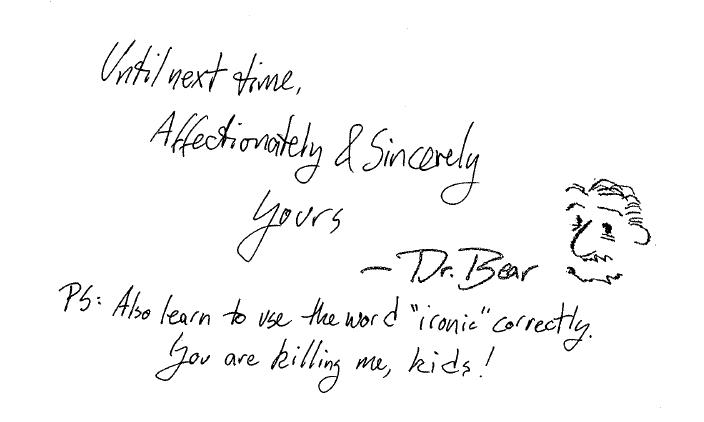
Mind your Happiness
What is it that we want more than anything else?
What is it what we work those long hours at jobs for, keep relationships alive for, save for, spend for, climb into the mountains for, drive into the city for, sit and wait for, climb those trees for?
Happiness.
 Even the closest rivals for what we might want more than anything else—that 22 year old single malt, that night dancing, that meringue, the sweet heat and tingle of physical pleasure, the intoxicating exhilaration of power, success, money—these are all things we desire in the faith (or the hope) that they will make us happy. But these are all fleeting, and too dependent upon the black and red wheel of fate or upon the whims of others.
Even the closest rivals for what we might want more than anything else—that 22 year old single malt, that night dancing, that meringue, the sweet heat and tingle of physical pleasure, the intoxicating exhilaration of power, success, money—these are all things we desire in the faith (or the hope) that they will make us happy. But these are all fleeting, and too dependent upon the black and red wheel of fate or upon the whims of others.
What we want is happiness and fulfillment.
Aristotle argues that happiness is the end towards which all our  human means are ultimately aiming, and that a happy human life is irrevocably tied to what it means to be human. To be a human being is ultimately to be a social being, and a rational being, so any account of human happiness will be an account of the character and types of actions and activities that allow us to find fulfillment—both socially and intellectually. The little ball on that wheel might not land on our number or even our color, and we might be smacked around by an indifferent world and cruel compatriots, but as far as our striving towards human flourishing, towards happiness, towards fulfillment is dependent upon our choices, we can cultivate virtues, excellences of behavior, and of the mind.
human means are ultimately aiming, and that a happy human life is irrevocably tied to what it means to be human. To be a human being is ultimately to be a social being, and a rational being, so any account of human happiness will be an account of the character and types of actions and activities that allow us to find fulfillment—both socially and intellectually. The little ball on that wheel might not land on our number or even our color, and we might be smacked around by an indifferent world and cruel compatriots, but as far as our striving towards human flourishing, towards happiness, towards fulfillment is dependent upon our choices, we can cultivate virtues, excellences of behavior, and of the mind.
That, my friends, is a very concise summary of Aristotle’s Nicomachean Ethics.
I’ve discussed the virtues of character elsewhere, and will again, I’m sure, but this week, I was struck by his discussion of the virtues of the mind. One reason I have tended to breeze through this part is because it is a bit vague, technical, and abstract, but especially because the moral virtues are so much easier to have discussions about. However, the main reason is because I have always associated Aristotle’s account of the importance of the development of the mind in general, and the importance of contemplation and the acquisition of wisdom with Plato’s contemplation of the forms. Aristotle’s account is much richer than that, though.
To be happy, to be fulfilled, to be self-actualized—whatever vocabulary you prefer—one must cultivate the mind, but also exercise it, and in all its dimensions.
He talks of φρόνησις—judgment—how we understand and choose appropriate behavior, the practical decision making of living with others. This is savoir-faire, a kind of knowing, but a way of knowing what to do, and as much a skill as a matter of content knowledge.
I think that the importance of exercising this part of the mind might go without saying—although we might not realize its importance in ourselves, we certainly recognize the lack of it in others—not just crudeness and lack of conscience, but an inability to recognize how are actions can make others happy or ruin their day. Since we no longer live within the confining certainties of Jane Austin’s world, we find ourselves largely playing this one by ear—I know killing is wrong, but when do I send a thank-you note? Even if you do not know the specifics, you can exercise some judgment:
if you do not hold the door for others, you are not a gentleman.
if you are unkind to the wait staff, you are not a good human being.
if you are cruel to children or animals, you are not human.
These are not open to interpretation.
He talks of τέχνη—skill—how we know how to do things. Like most philosophers, Aristotle privileges the abstract over manual labor, but he does recognize that craft and skill are important (he was, after all, a physician, a skill I appreciate). He also recognizes the way in which the knowledge of the hands is a form of knowledge.
To stretch the parts of our minds which create is as pleasurable as stretching our back muscles in the warm sun; to make something good is one of the most fulfilling things a human can do; to make something beautiful is to build ourselves a bit more soul. To not be allowed to make things, to not be able to cultivate skills which we know are ours, to merely process or move things back and forth, or to shuffle papers and figures for a living is deadening.
He talks of ἐπιστήμη—knowledge—and of νοῦς—understanding—both of which are ways we know things. He sometimes makes the distinction of knowledge being about knowing things, whereas understanding being about understanding the abstractions behind them (and wisdom being the understanding the first principles behind everything), but I like to think of them as knowing facts and data—Turkey is in Asia, Sweet Potatoes & Yams are not the same things, the average airspeed velocity of an un-laden European Swallow is roughly 11 meters per second or 24 miles an hour, etc. Understanding can go beyond this raw data and build upon it.
As anti-intellectual as we sometimes can be, the fact remains that we human beings derive pleasure from knowing and from understanding. We want to figure out what that 5 letter word at 8-down is, how to get all 9 numbers in each of the 9 squares, and we want to beat the dweebs on Jeopardy. We do memorize baseball statistics and keep track of basic Tardis data. We try to understand how UT might finally get a winning football team again and how the living dead move. We want to know how Sherlock survived his fall and where the second gunman on November 22nd 1963 was.
Of Aristotle’s fifth intellectual virtue, Σοφία—wisdom, sweet wisdom, holy Sophia, gift of Athena—I have, and will continue to write of her.
Using our minds is a necessary part of human happiness; if we have nothing to think about, we are miserable. Boredom gets us into more trouble than almost anything else.
When I talk to people suffering from losing the ability to discipline their thoughts, they are really suffering. To lose one’s mind is, of course, tragic, but even to lose bits of memory and reasoning is terrifying and terrible.
So exercise your mind—use your judgment, your skills, pick up new information and gain new understandings; not everyone can win at blackjack every time (except, so far, Summer), but you can use your mind, you can control this puzzle-piece of your happiness.
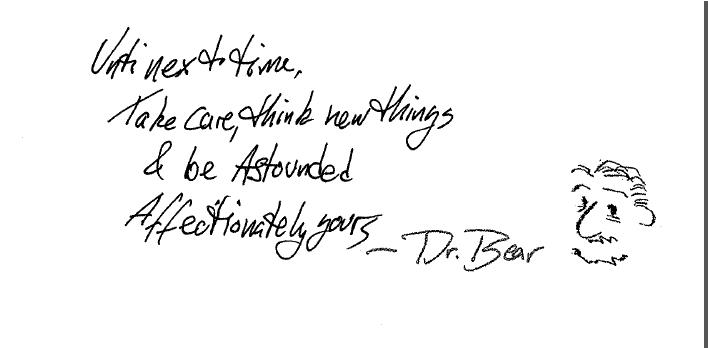
Where do I go from here?
Last week, I was serving drinks at the Bistro bar when someone asked: “Where do you go when there is nowhere left to go?”
It is a question I have been asking myself for over a year now. “Maybe it’s the time of year, or maybe it’s the time of man,” or maybe it’s the time of life in which I find myself, but there seem to be more walls and fewer horizons in my life than there used to be.
One option, of course, is to try to retrace, to try to go back to a time when there seemed to be endless possibilities—or, at least, there still seemed to be possibilities, or to try to recapture that person you once where, and then try to look for new directions, either new possibilities that might have been forgotten or over-looked, or new insights from rediscovering your earlier self.
It is not a bad start, and it may clear your head, but—informative as the past might be—the past is past. As Thomas Wolfe famously pointed out, “you can’t go home again.”
The past is a lovely place to visit, but a person has to find another place to live.
Another alternative is resignation, to choose to embrace the present, to look beyond the problems and limitations that seem to haunt you, and even the numbing dead-ends and losses of your professional and personal life, and to lose yourself in the moment, such as it is, one way or another.
Of course, you can deaden the present, and find solace and comfort where you can, looking for your own personal safe havens or clean, well-lighted places. This may avoid the problem, but it still leaves you with a slow, shuffling specter of yourself to live with.
Heidegger once said that without any real hope of progress, all that remained for the thinker was to prepare a place, a clearing, for the return of god. By and large, this seems to be the last philosophical suicide by an old man whose philosophical acuity had died decades earlier, not having survived his personal integrity by long. Are we worth saving if only a god can safe us?
However, passively resigning to fate and minimizing the desires of the self which connect us to this world is, for many, a viable strategy. This has been part of the rich heritage of Buddhism: to not gorge yourselves upon this world and your own self until you become trapped and wallowing like a fattened banana-fish. Accept the illusion of selfhood, and transcend it.
While it may be selfish to desire things, and it may be selfish to build up oneself—or even build protective walls around oneself—at the expense of others, it is not selfish to demand to have one’s own self, and perhaps even a place of one’s own. To be is to be myself; my own pain is not an illusion to be overcome, but is a part of me. My scars are my skin, and my skin is my scars, and I am both.
Another similar alternative is to seek comfort in the close company of others, to lose oneself either in the warm embrace of friends, or of family, or of other communities. This may diminish the discomfort, or may make it more bearable, but the heart resists and the mind wanders.
To be companions is more than just sitting and breaking bread—it is to be on a journey together, and this needs motions and change, destruction and growth, and perhaps even loss. However, to move is to live; Allons-y!
A final alternative that remains is re-invention. No, we can’t change the past, and we can change very little about the present, but the future will always be infinite possibility. There are limits to how far you can re-imagine yourself, but those limits are only slightly smaller than your imagination. The world will set limits on us, but the walls will close in on us and crush us eventually, so why not try to scale them? Why not leap?
Rage, rage! Dare! Sound your barbaric YAWP over the roofs of the world! Wear bright yellow! Write new things! Say what you mean! Make cookies with Sriracha, and Scallops with Seitan!
Are you worried about what you will do after you leap?
Audio Post, October 10th, 2013: Recipes, Rules, & Realtivism
As usual, for my friends who have trouble sleeping, or for those who just prefer their Bistro aurally, here is the link to the audio version of tonight’s post.
http://philosophybistro.tumblr.com/post/63675212054/as-usual-for-those-of-you-needing-a-sleeping-aid


Recipes, Rules, and Relativism
It recently occurred to me how odd my recipe collection here in my posts is.
From reading here, one would get the impression that I cook mostly muffins; that is not the case. The recipes that I post are for things that I actually bother to follow a recipe  for; most of the things I cook–the stews, pastas, potatoes & rice dishes that make up my day-to-day life aren’t necessarily planned, and certainly aren’t measured–and this is what most cooking, as well as most of my life, is like: I look at what’s available, and I make the best of it. I recently had a wonderful pineapple-coconut-upside-down-pie that long time reader and Bistro regular Rachel had made, but she couldn’t have told me the recipe–she just put in what she thought would be good (and it was).
for; most of the things I cook–the stews, pastas, potatoes & rice dishes that make up my day-to-day life aren’t necessarily planned, and certainly aren’t measured–and this is what most cooking, as well as most of my life, is like: I look at what’s available, and I make the best of it. I recently had a wonderful pineapple-coconut-upside-down-pie that long time reader and Bistro regular Rachel had made, but she couldn’t have told me the recipe–she just put in what she thought would be good (and it was).
There are people whom this drives crazy–they need to be able to measure everything, and they need to know exactly what to do and when to do it. They need hard, fast formulas that they can follow to the letter to be absolutely certain that it comes out right. Lots of recipes are a good thing when you are still just trying to find your way around a kitchen, but eventually, they just become “guidelines.” Apples, potatoes & carrots don’t come in uniform sizes, flour doesn’t come in uniform levels of moisture, even the difference in air pressure on different days can change food–you are working with food, not forcing it to do something.
Now, there are things that matter:
Proportion matters; in oatmeal or rice or other cooked grains, the amount of liquid will be twice that of the grain. The perfect biscuit has a perfect proportion of flour, leavening, shortening, and moisture. It is obviously possible to have too much salt.
For some dishes, recipes matter more; bread involves a great deal of time letting the dough rise and then bake, as do cakes, and there is really no way to alter the recipe in the middle of baking the way I constantly do with soups, stews, etc. Cooking for large groups, it is also necessary to have some recipe in mind, just because of the difficulties of scale.
But even with things that have no recipe, it is possible to say that you got it right  (Rachel’s pie, the Seitan Sauerbraten I made up), or that you got it wrong (the first attempt at the spun sugar nests). The balance, the flavors, how well, but not over-cooked things are–these are all there regardless of any recipe, regardless of even knowing what the experiment is supposed to taste like.
(Rachel’s pie, the Seitan Sauerbraten I made up), or that you got it wrong (the first attempt at the spun sugar nests). The balance, the flavors, how well, but not over-cooked things are–these are all there regardless of any recipe, regardless of even knowing what the experiment is supposed to taste like.
Some people need rules the way that other people need recipes.
They are not happy–well, generally, they just aren’t happy–but they just aren’t happy unless they have rigid rules and formulas to order their lives by. Anybody who doesn’t accept their rules is a danger, a challenge, a sinner, or–perish the thought–a relativist.
Rules are fine in certain circumstances.
Small children, like beginning cooks, need clear instructions and clear guidelines. There are also trickier situations, more complex situations where it is good to have worked out standards because the results could be so disastrous, and the long-term results are too difficult to see before it’s too late. In situations involving large groups of people, it is also good to have a clear understanding.
But virtue isn’t always dependent upon categorical imperatives or divine fiat. Sometimes we have to make decisions about how to react in an appropriate way, or how to be a good person, in the circumstances we find ourselves in. This isn’t relativism: a good cook doesn’t need a recipe to know that a dish is awful, and a good person does not need laws to understand that hurting another creature is wrong. A good cook knows that braising and slow roasting will give food more flavor, and a good person knows that patience and kindness make the world better.
“Ave, Jeff Bezos, morituri te salutant!”
Bezos.
 I’ve been thinking about Jeff Bezos this week, in part, because I was also trying to teach about Plato’s Philosopher Kings.
I’ve been thinking about Jeff Bezos this week, in part, because I was also trying to teach about Plato’s Philosopher Kings.
Bezos, for those of you who don’t know, is an evil Sith Lord ruling an all-powerful empire bent on destroying anything that is beautiful and of value to us.
No, of course not. He is, however, the founder and CEO of Amazon.
What he managed to do was found a company which could take advantage of the strength of the internet—ease of ordering, convenience—and couple that with the ability to manage a huge amount of inventory—including inventory he did not actually have to possess or control—and the new possibilities of rapid shipping. By coordinating all of these parts better than anybody had managed before him, and by using the volume and the lack of actual inventory to keep costs incredibly low, and by coupling these with amazingly good customer service, he managed to build an unequaled on-line bookstore, and then a larger on-line market place, and become the first realistic leader in the electronic book business—a business which played to Amazon’s strengths, eliminating the problems of delivery and inventory, but adding the challenge of actually having to design, build, and maintain a physical product: the kindle.
This is a charitable interpretation, but, I think, an accurate one.
I’ve been a book customer since before I can remember.
I’ve worked in several book stores.
I want to disdain Mr. Bezos, because Amazon is driving bookstores out of business.
But I can’t; he is getting books to people—either electronically or in the mail—with great efficiency, and at a lower cost. How are we to fault that?
Besides, he can get me stuff nobody else can, and Wow! Does Amazon have great customer service!
As I said, I’ve been teaching a seminar class on Plato’s Republic, his utopian vision where decisions are made for us by wise, benevolent rulers.
So, perhaps, we should allow businesses to be dominated by those wise folks who can figure out how to make it work better, how to make it work best, and let them do what they do best. Bezos is sharp, he has read the market well, he offers a quality service, and he does something that is dear to my heart: he gets the written word to people.
However, in doing so, he has forever changed the business of books.
 There are unintended consequences to any series of choices, but with a shift of this magnitude there will be even greater consequences.
There are unintended consequences to any series of choices, but with a shift of this magnitude there will be even greater consequences.
We no longer browse shelves in the way we used to—there is no longer the serendipitous moment when we pick up a random book because it strikes our fancy, and begin to leaf through it. Sure, we can find new books on-line, perhaps even sample some pages, but it is harder to get captured in the ruffling of pages that brings us to a sentence or story that captivates us.
There still can be folks to discuss and recommend books—chat rooms, recommendations, posts, etc.—but these are read in the same way the sample is read: not with the enthusiasm of a flesh & blood human being handing us a book and saying “You have to read Helene Wecker’s The Golem and the Jinni!” (http://www.youtube.com/watch?v=msy1ctlRh4Q) I have a friend who actually remembers the names of booksellers at a local Indie and looks for recommendations from her favorites. This is the kind of interaction a local brick & mortar store can give. I have seen it happen on-line as well, but I still think it happens best face to face.
Furthermore, Amazon is primarily a distribution company, and because of its success has been able to dominate the companies which actually produce the product, companies which have greater risk in accumulating inventory, and greater expenses up front. Although Amazon has taken its toll on chain booksellers like Borders (rest in peace) and Barnes & Noble (bless their hearts)—as they, in turn, wiped out smaller bookstores, its greater long term impact—as well as the impact of the move to digital books in general—will be upon publishers, because this will affect the way books are actually produced, eliminating editors and other ways of cultivating talent.
The greatest danger, however, might be one inherent to success and centralization:  markets dominated by a single or even just a few corporations are unwieldy and unstable. Having the decisions about the future of an entire industry made in one or two board rooms—whether Amazon or Monsanto—is not very different from having decisions made by a centralized Politburo committee.
markets dominated by a single or even just a few corporations are unwieldy and unstable. Having the decisions about the future of an entire industry made in one or two board rooms—whether Amazon or Monsanto—is not very different from having decisions made by a centralized Politburo committee.
Freedom aside, a corporation as big as Amazon cannot turn on a dime. It would be nice if those leaders were self-less, all-wise philosopher kings who were capable of making good choices, but they are humans, like we are, and it is hard to judge the unintended consequences of the decisions they make. Unlike the humans who are actually interacting with local customers daily, and have small enough operations to make changes, corporations change slowly, and react slowly.
What can we do?
Well, support alternatives!
Buy local.
If you have to choose, buy regional, since they are more likely to be in touch with the local economy, and with local producers.
Buy Indie.
Independent booksellers and food producers are outside of the decision making process of the corporations, although they are still influenced by it. They are closer to you, and able to adjust their courses based upon what is happening “on the ground” rather than having to wait for decisions from a detached board room. They are also more likely to cultivate diversity, leaving room on their shelves (or in their fields) for genetic variation, so that we won’t just be stuck with pasty golden delicious apples and 50 Shades of Gray.
So buy local. Drop by CSAs like Trosley Farm or a road-side produce vendor.
Share a local microbrew at a local restaurant like The Acoustic Coffeehouse or the Philosophy Bistro.
If you can’t find what you need locally, find an independent dealer like Malaprop’s Bookstore not too far away, or find an independent business on-line like Glynne’s Soaps and use Amazon’s tools against him.